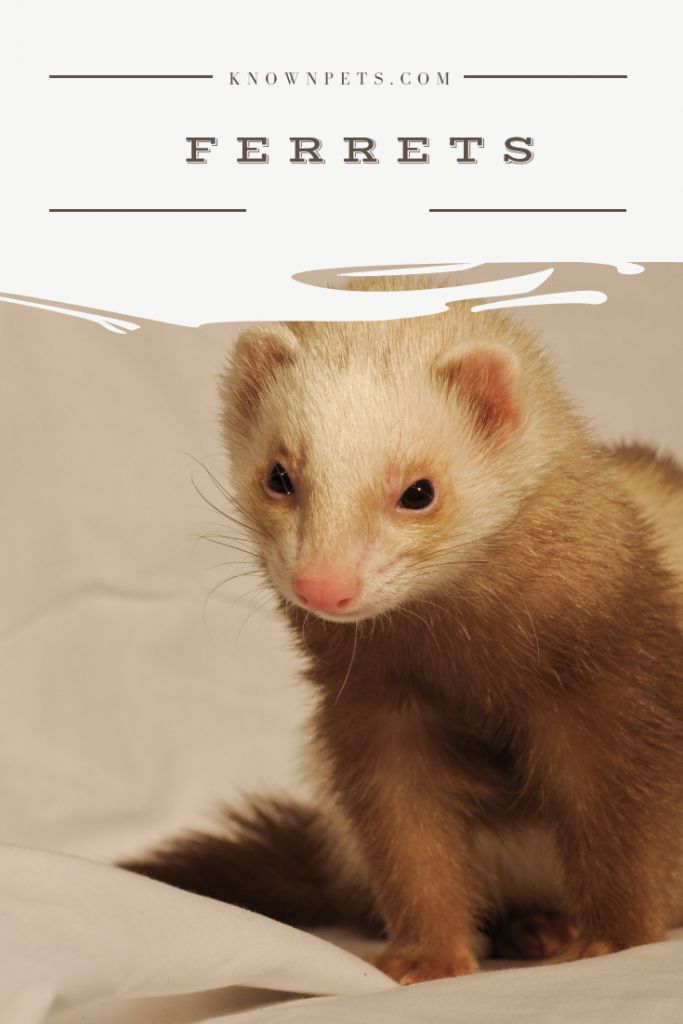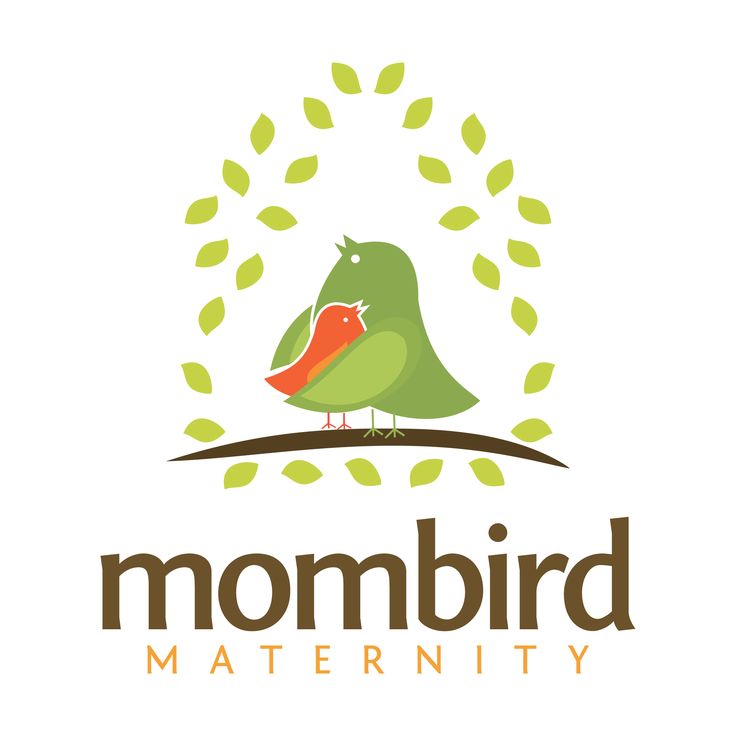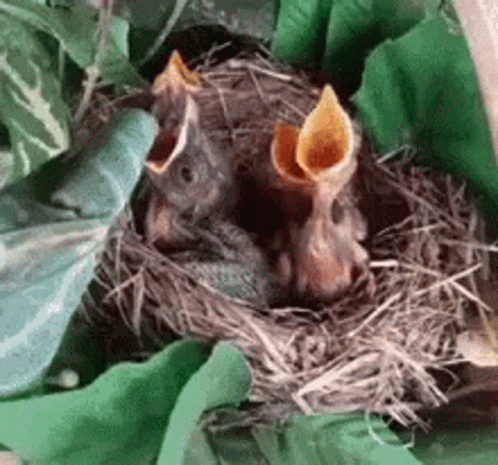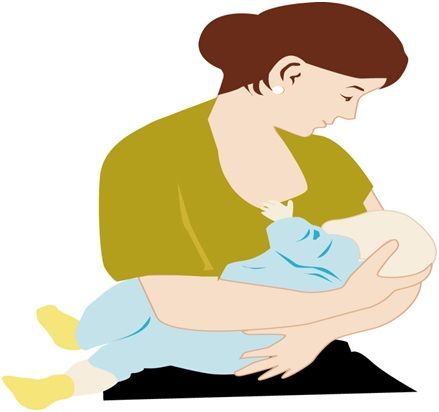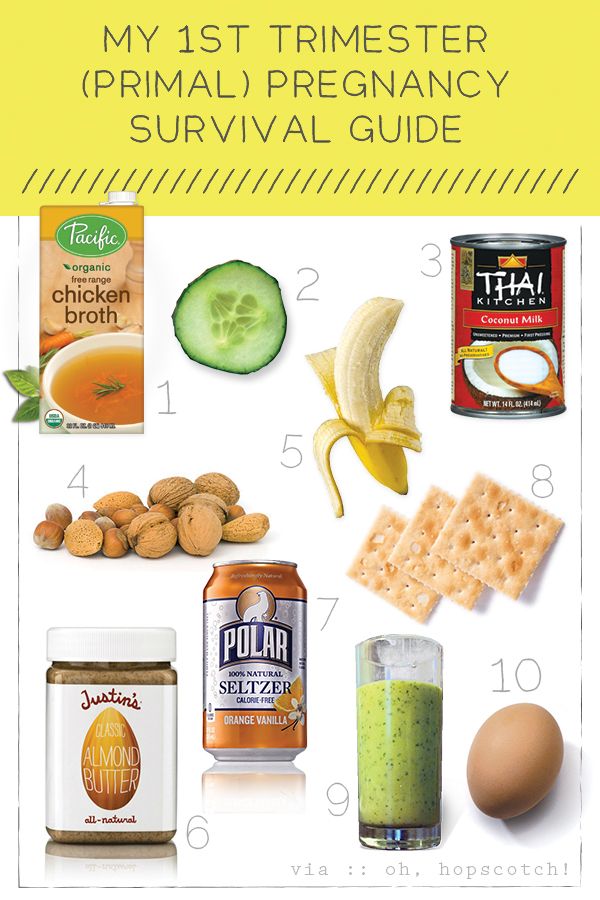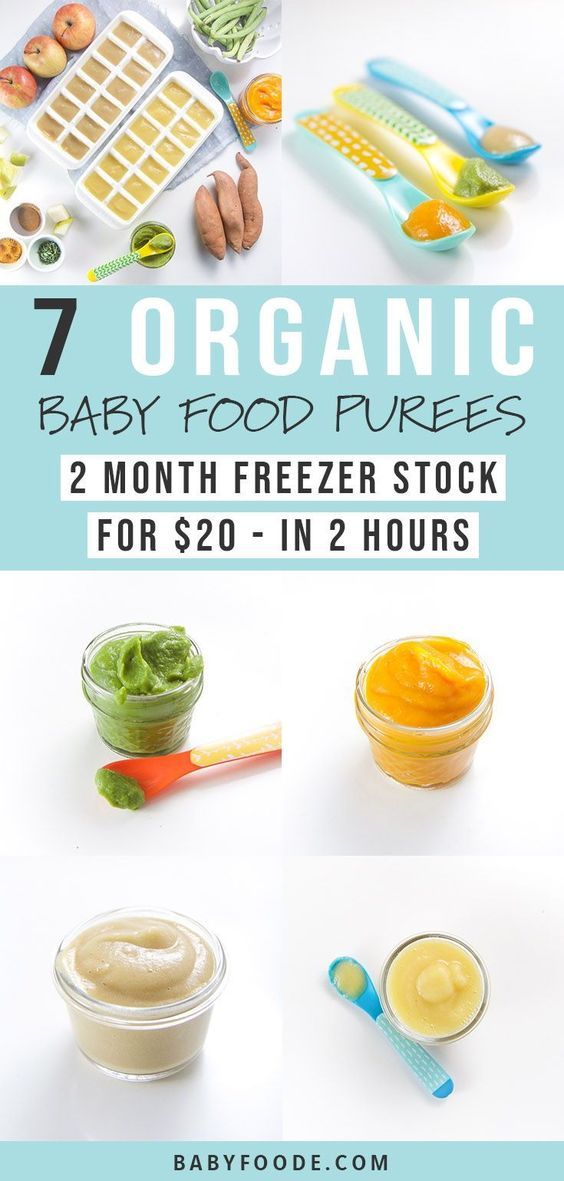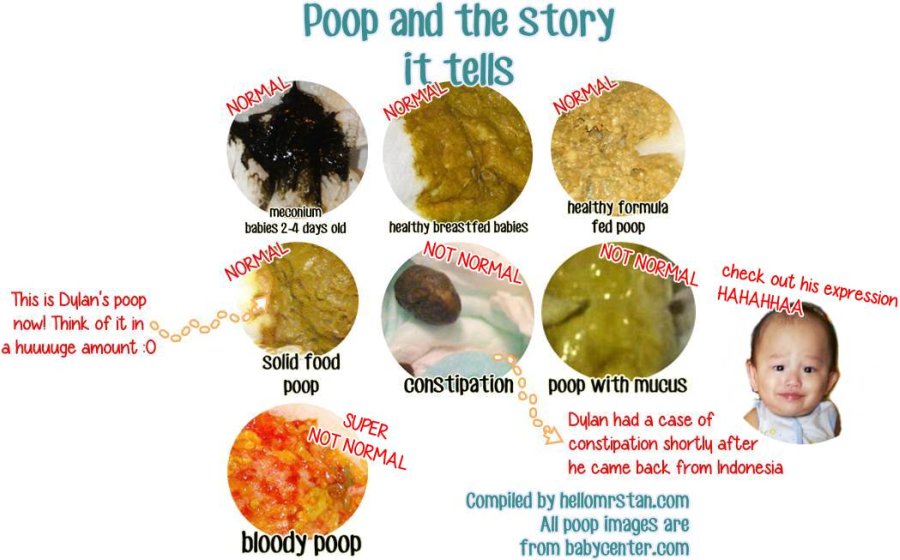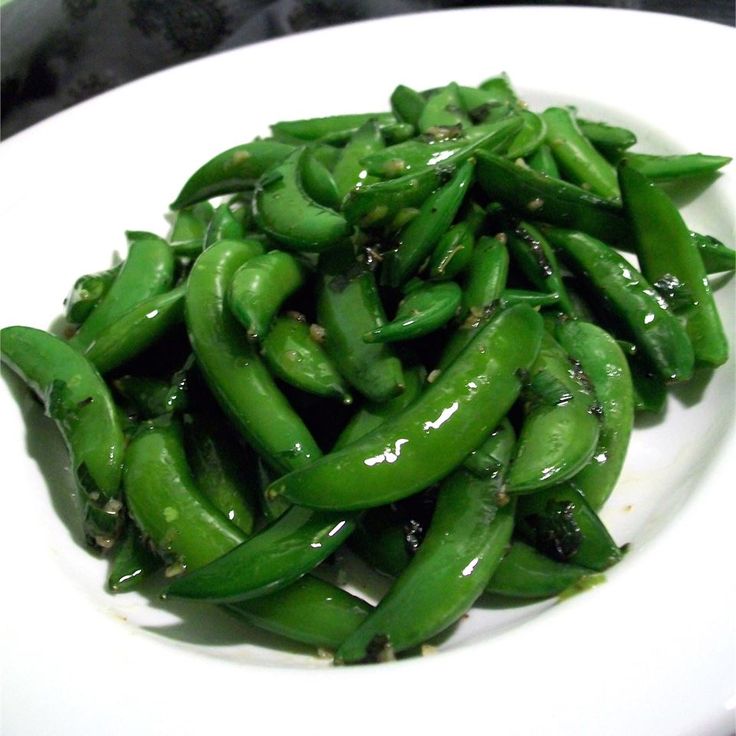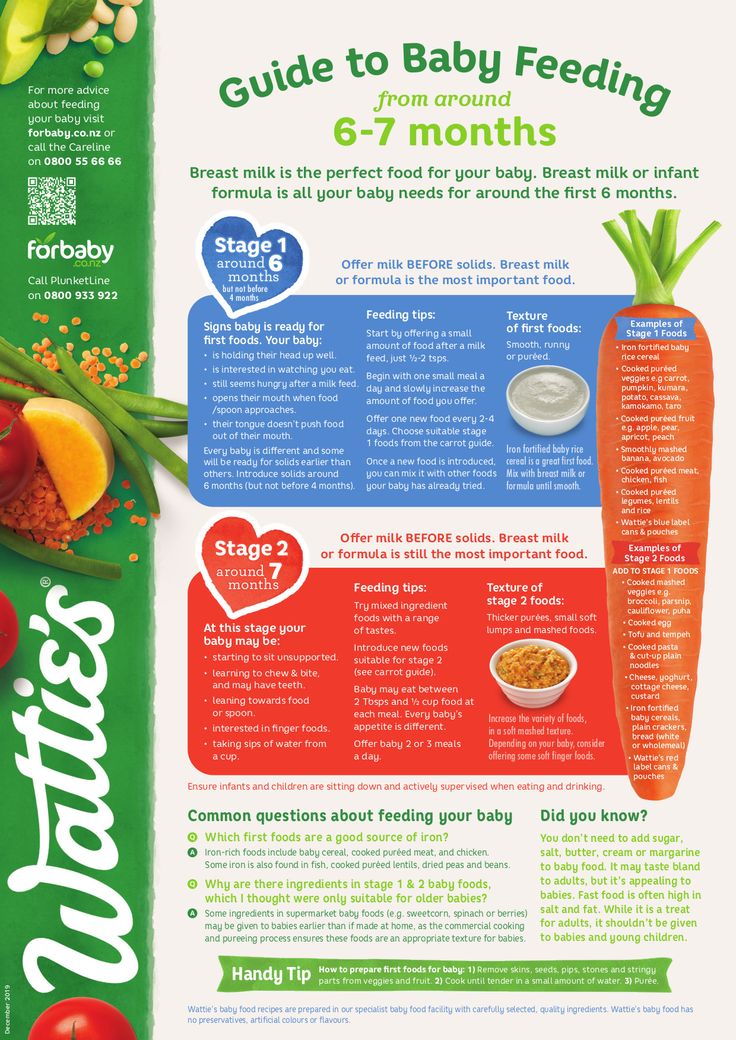Feeding baby ferrets
What do ferrets eat? The best food for your ferret and the worst
Is your ferret insured? Get a quote for up to £2,000 of vet fee cover | Insure up to 3 pets per policy | We’ve been insuring exotic pets since 1996 | Check out our customer reviews on Feefo.
Jump to: What do ferrets eat? | Ferret diet | What do ferrets eat in the wild? | What do you feed a baby ferret? | How often should I feed my adult ferret? | Tap water | Can a ferret eat dog food? | Can you feed a ferret eggs? | Can a ferret eat cat food? | Can a ferret eat fish? | Do ferrets eat nuts? | Do ferrets eat rabbits?
What do ferrets eat?
Ferrets are obligate carnivores, which means they must eat meat.
Raw meat is the best option, including whole prey. Ferrets can also eat kitten food, as it has a high meat protein content, baby food that's high in meat protein, and dried ferret food, that's high in meat protein.
As an occasional treat, your ferret can also eat eggs.
A ferret's diet should consist of 32 – 38% protein and 15 – 20% fat.
Ferrets can eat the following raw meat:
- Chicken wings and stripped carcasses
- Turkey necks
- Rabbit
- Game birds
- Pigeons
- Minced beef
- Lamb
- Offal
- Lambs heart
- Raw animal bones for calcium and for cleaning your ferrets teeth
- Chicken
- Lamb
Source: The British Ferret Club, Feeding Adult Ferrets
Ferrets can also eat whole prey including:
- Mice
- Rats
- Chicks
Source: Susan Brown, DVM, Rethinking the Ferret Diet.
Although you may not like the idea of feeding raw food to your ferret, it replicates her natural diet, meeting her nutritional needs.
Make sure you buy good quality meat, and buy any rodents from reputable retailers.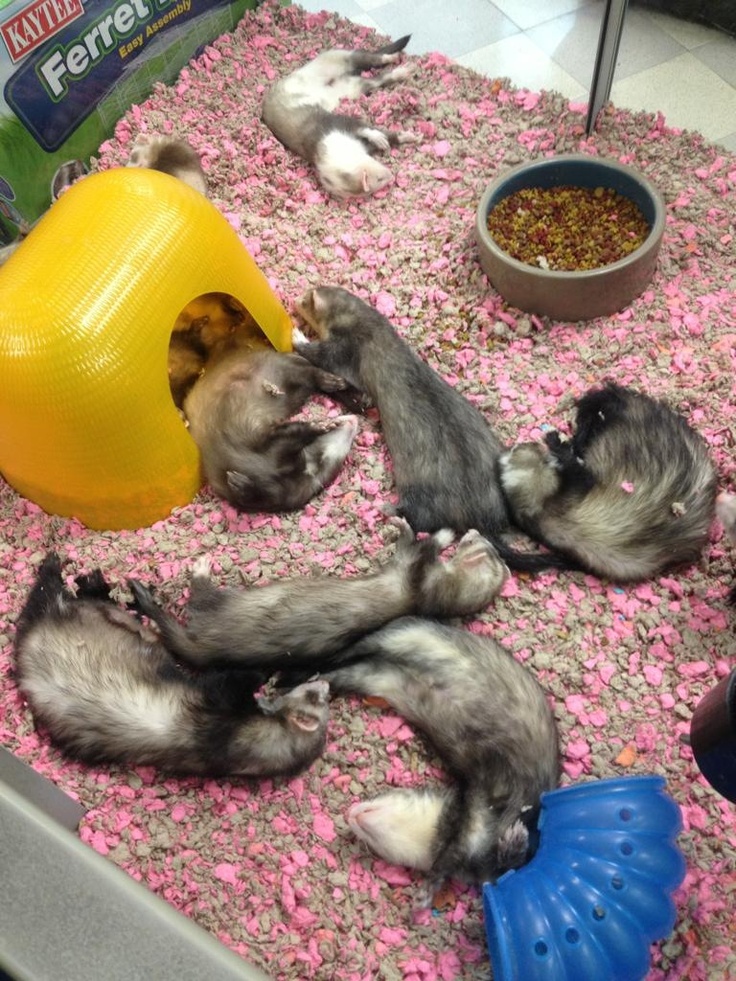 Don’t be tempted to try and catch any rodents yourself, as they could contain parasites.
Don’t be tempted to try and catch any rodents yourself, as they could contain parasites.
You should therefore be aware that your ferret might also try to hide some food for later on. This could be dangerous, as raw meat could go off, and cause food poisoning.
Your ferret is part of your family but make sure she eats the right food for her.
Ferret diet
Ferrets have a short intestinal tract and absorb nutrients inefficiently, which is one of the reasons their diet needs to be high in meat based protein and fat. Their bodies digest these easily, and they provide lots of energy.
You should minimise the amount of fruit or vegetables that you give your ferret. These contain complex carbohydrates which are high in fibre. Ferrets can't digest fibre, meaning they have a low nutritional value.
A diet high in carbohydrates can also lead to disease in ferrets, as can vegetable protein that's also found in fruit and vegetables. Find out more about foods that ferrets can't eat and why.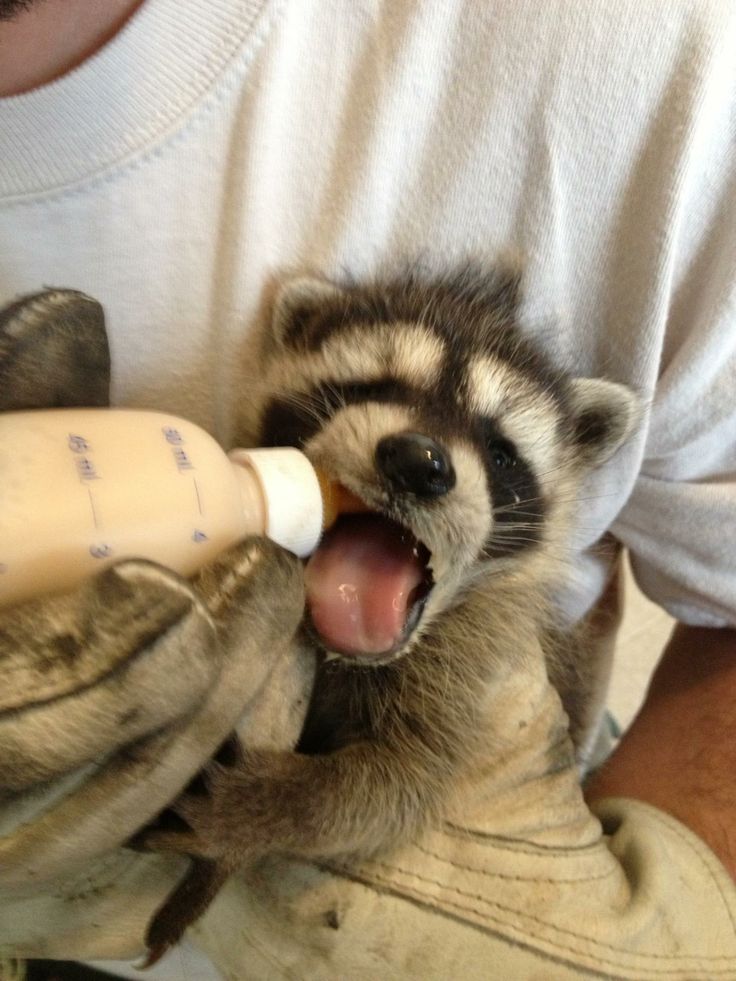
Due to their short intestinal tract and high metabolic rate, ferrets must also eat little and often.
You may like to read this: Looking after and caring for a ferret
What do ferrets eat in the wild?
In the wild a ferret would eat every part of the animal including its bones, and this action would not only benefit her health, but offer stimulation and exercise her jaw.
Kristen's ferret was very poorly in 2016. Her ferret was unable to walk and lost a third of his body weight in three weeks. She was covered by ferret insurance - read her review.
What dried ferret food can you buy?
You can buy Burgess ferret food; Chudleys; Optima and James Wellbeloved ferret food.
When buying dried ferret food ensure it contains more meat protein than any other product. If it's high in carbohydrate and fibre then you should avoid it.
Did you know that our Ferret insurance can cover £2,000 of vet fees. Cover can be per pet (up to three pets on a policy) or per policy.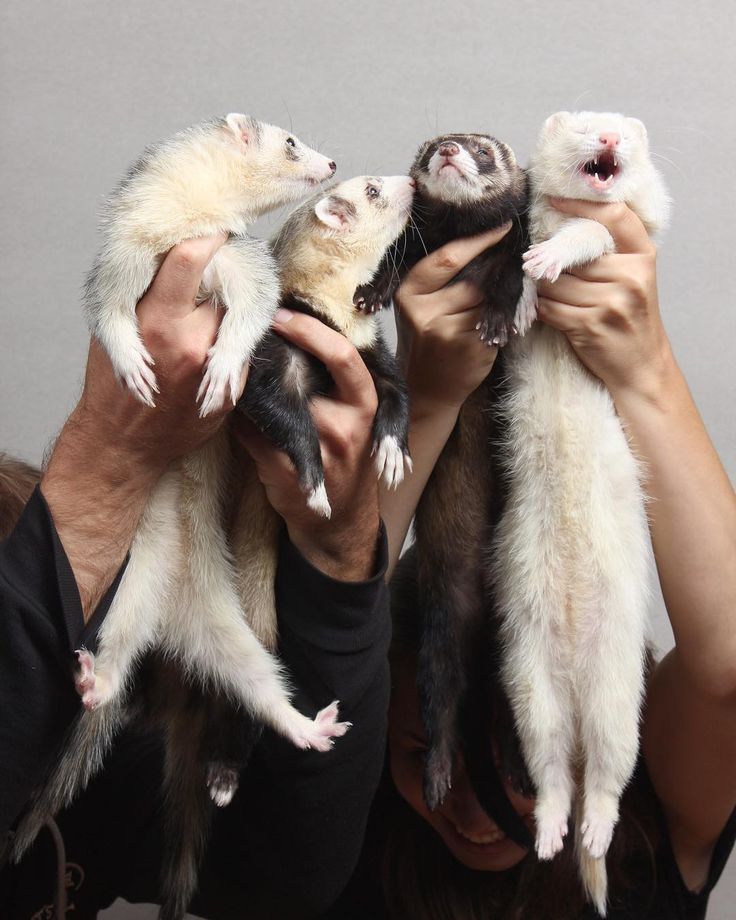
Get a quote
Food that ferrets can’t eat
Ferrets shouldn't eat fruit or vegetables as a main part of their diet.
Ferrets shouldn’t be fed food containing complex carbohydrates as a main part of their diet as these contain fibre. Ferrets can't digest fibre, which means the foods have a low nutritional value.
The reason they can’t digest these is because they have no cecum – this forms part of the digestive tract in many animals, and can produce bacteria that digests complex carbohydrates.
In addition a diet high in carbohydrate can lead to an excess of glucose in your ferret's blood. This could cause insulinoma - cancer of the beta cells in the Pancreas according to Susan Brown, DVM.
Vegetables can also contain vegetable protein, which your ferret can't digest very well. If she eats too much then it can lead to disease, such as bladder stones, ulcerations of the skin, gastroenteritis, reduced reproduction ability and her kits could suffer with poor growth.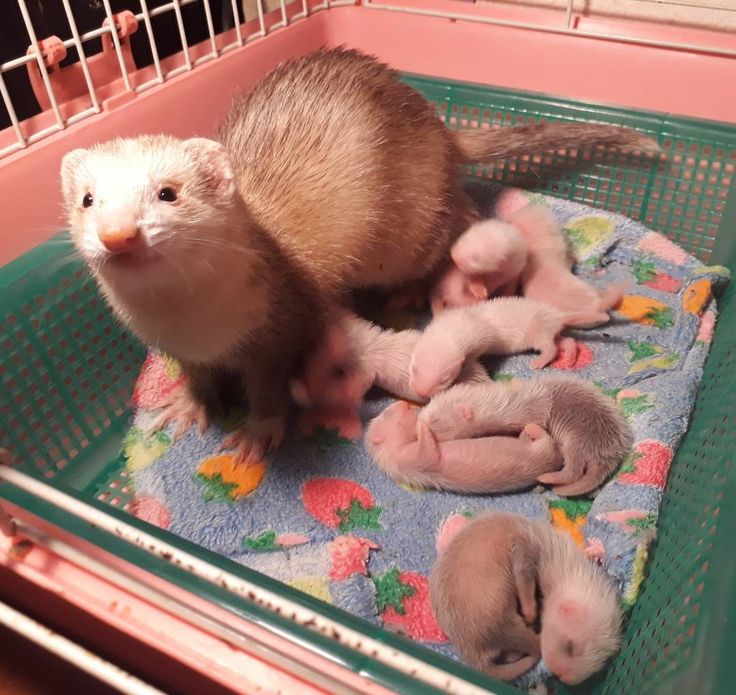
Try and avoid the foods listed below, as they're high in complex carbohydrates and fibre:
Fruit and vegetables you shouldn't feed your ferret
- Apple
- Blackberries
- Lentils
- Lima Beans
- Pears
- Pigeon beans
- Pink beans
- Pinto beans
- Raspberries
- Spinach
- Small white beans
- Winged beans
- Bananas
- Blueberries
- Broccoli
- Brussel sprouts
- Dates
- Figs
- Green Beans
- Guavas
- Kiwi fruit
- Onions
- Oranges
- Split peas
- Dried plums
- Sweet potato
- Peanut butter
- Raisins
- Rice
- Bananas
- Salt
- Chocolate
Source: Fruit and Veggies - More Matters & The American Ferret Association
Your ferrets diet should be primarily meat and fat as in the wild.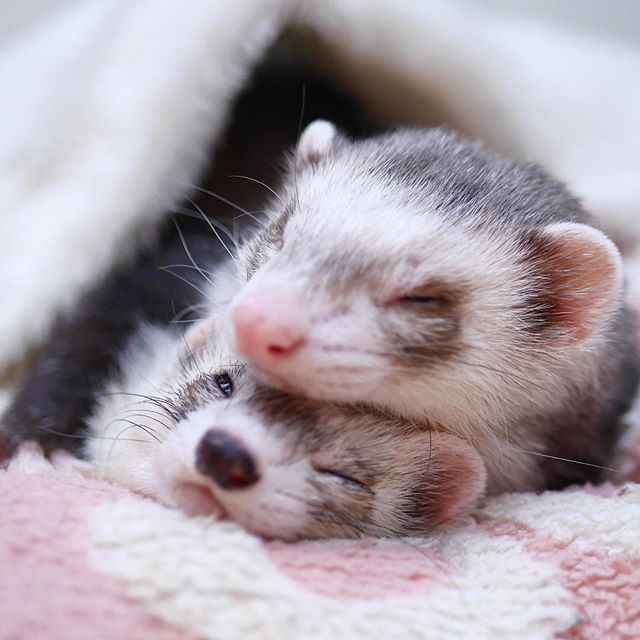 She will gain her energy from those foods, and not carbohydrates.
She will gain her energy from those foods, and not carbohydrates.
Your baby ferret's eating habits are shaped while they're young.
What do baby ferrets eat?
You can feed your baby ferret a combination of fresh meat, goats or low lactose milk and water.
You can feed your baby ferret around four times a day using the following plan:
- Breakfast: Water and fresh meat chucks
- Lunch: Fresh meat
- Dinnertime: Fresh meat
- Suppertime: Meat on the bone followed by goats milk or a low lactose milk
(Thanks to The British Ferret Club for their Kit dietary advice)
Ferrets tend to bond with their food as Kits, and once they’re older it’s harder to change their eating habits.
You should encourage them to try lots of different foods when they’re young, to avoid problems later on in life.
It’s also a good idea to give them soft foods occasionally, such as baby food (high in meat protein), or dried food soaked in water occasionally.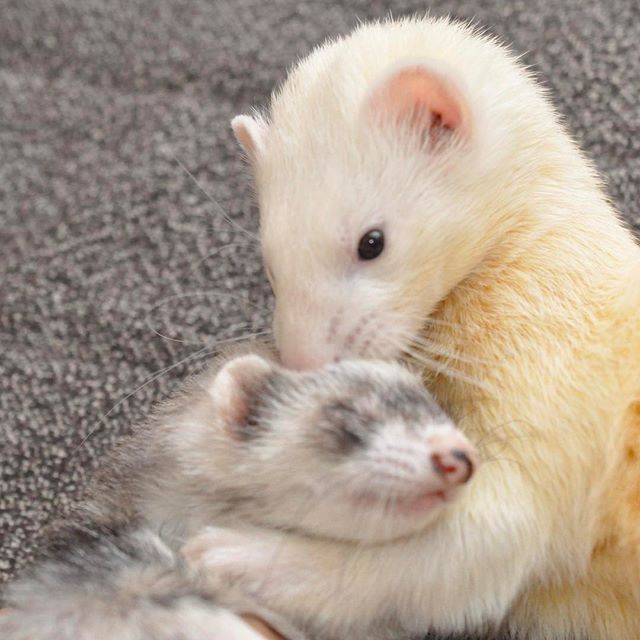
This is so they don’t reject softer foods when they’re ill, and unable to normally.
How often should I feed my adult ferret?
Opinions vary on how often, so be guided by your pet – just remember not to overwhelm her with food, as she won’t be able to eat it all.She may then resort to hoarding it for later. If it’s a meat product this could have obvious consequences in that it could go off before she eats it.
If you work during the day, then try leaving some ferret kibble out for her to eat when she’s hungry. Alternate ferret kibble and fresh meat when you’re at home.
With all this food, you also need to make sure that your ferret gets plenty of exercise in order to prevent her from getting fat.
Can I give my ferret tap water?
Yes, tap water is fine for your ferret.
If your ferret turns her nose up at, it may be because she can smell the chlorine. Try filtering it to see if that helps.
It’s really important to provide your ferret with lots of fresh water daily to avoid dehydration. Ferrets can get thirsty, particularly if they’re eating a dried ferret food, or if it’s the summer.
Can a ferret eat dog food?
No, it’s not advised to feed your ferret dog food. This is because it’s not high enough in protein and fat for your ferret.
Dog food also contains vegetable protein and fibre which cannot be digested by ferrets, and can cause disease.
Can you feed a ferret eggs?
Yes, you can feed your ferret cooked or raw eggs as a treat.
Limit them to once or twice a week, as more than this could cause constipation.
Can a ferret eat cat or kitten food?
Yes, your ferret can eat kitten food, as it has a high meat protein content. Cat food doesn’t contain the same protein levels, so isn’t as beneficial for your ferret.
Can ferrets eat fish?
Ferrets can eat fish, however it’s not naturally part of their diet. Some pre-prepared ferret foods do contain fish, which may not be to every ferrets’ taste.
It’s probably better to pick a pre-prepared food that contains meat rather than fish.
What treats can you give ferrets?
You can give your ferret meat or eggs (one to two a week).
You can also feed baby food with a high meat content. Any treats should be high in meat protein. Sweet, complex carbohydrate or dairy products can be harmful.
Treats should also be in small quantities to avoid filling her up too much, due to her small intestinal tract.
If you want to give your ferret specifically designed ferret treats, make sure that they don’t contain complex carbohydrates. Some products sadly do, which can be harmful for ferrets.
Do ferrets eat nuts?
No, ferrets shouldn’t eat nuts, they contain complex carbohydrates which can cause illness in ferrets.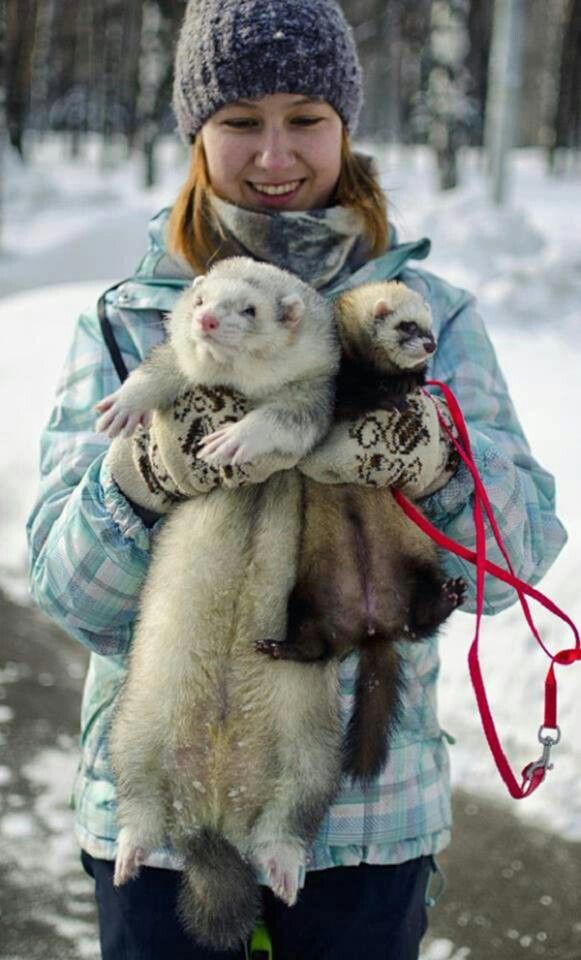
We can cover ferrets for up to £2,000 in vet fees. Cover can be per pet or per policy. Why not find out more?
Do ferrets eat rabbits?
Yes, it's likely that if provide your ferret with rabbit, she'll eat it.
If you own a pet rabbit, keep them away from each other.
Ferrets are naturally hunters of prey, and will chase down wild (and domesticated) animals that her ancestors would normally eat in the wild.
Urinary tract stones in ferrets
Calcium oxolate is the compound in stones that can form in a ferrets urinary tract. They’re very painful for ferrets, and are caused by eating plant based proteins, dog food and poor quality cat food.
The stones are most common in ferrets aged three to seven years.
And finally....
We really hope that you've found this article helpful. Ferrets are such cute pets, and it can be so tempting to give them foods that they seem to enjoy. However, their little bodies might not.
However, their little bodies might not.
Like with dogs and chocolate - don't be tempted to give in because your ferret looks cutely at you. Because you want to keep her fit and healthy.
And with the right kind of food, and the love, care and attention you'll give her, hopefully your ferret will live a long and happy life.
Do you need insurance for your ferret? Get a quote for up to £2,000 of vet fee cover | Insure up to 3 pets per policy | We’ve been insuring exotic pets since 1996 | Check out our customer reviews on Feefo.Disclaimer
This article is intended for guidance only. Although we've done our best to ensure the facts are correct, we naturally cannot guarantee this, as we're not vets or nutritional experts. If you're unsure about what to feed your ferret, you should consult your vet.
Feeding Your Ferret
On average, a ferret will eat 5-7% of their bodyweight in food every day.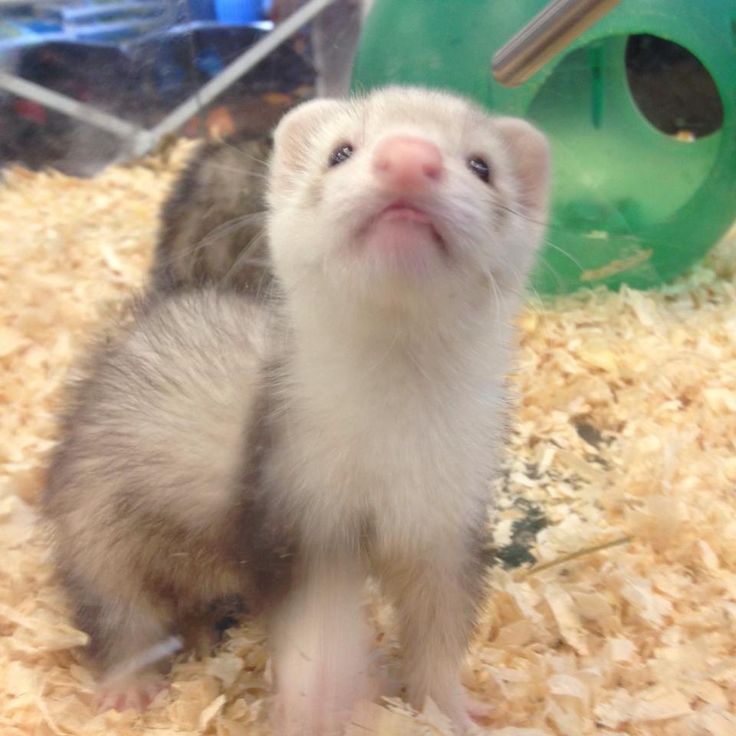 This is just a guide, however, as during growth, pregnancy, lactation or periods of high exercise they will need to eat more. Conversely, older ferrets may well need less than this, so monitoring your ferret’s weight and changing the diet accordingly is important throughout their life.
This is just a guide, however, as during growth, pregnancy, lactation or periods of high exercise they will need to eat more. Conversely, older ferrets may well need less than this, so monitoring your ferret’s weight and changing the diet accordingly is important throughout their life.
All ferrets are obligate carnivores – this means they need animal protein to survive. They also require high amounts of fats, higher than other common pets such as cats and dogs. Many ferret owner choose to provide this nutrition via pelleted ferret food, which should contain a meat source such as chicken or lamb as the main ingredient (not fish). If you have a choice, smooth, small chunks are easier for your ferret to eat than more angular pellets and ideally a pelleted food will contain 32-38% animal protein – don’t be afraid to check the back of the bag and make sure you are getting what your ferret needs.
Another option for providing the protein your ferret needs is with kitten food. This has high protein, and is a suitable base diet for ferrets, although they will need extra fatty acid supplements as kitten food does not provide enough of these for ferrets. Cat food has less protein content than kitten food, so kitten food is much more suitable.
This has high protein, and is a suitable base diet for ferrets, although they will need extra fatty acid supplements as kitten food does not provide enough of these for ferrets. Cat food has less protein content than kitten food, so kitten food is much more suitable.
Dog food has far too many carbohydrates in and is just not suitable for the ferret digestive system.
You can top up your ferret’s protein, and provide a bit of fun, using supplementary cooked meat sources such as pieces of chicken, cat treats and cooked egg as treats. This is great for them, and offering a variety of food from a young age will make your ferret much more open to a range of foods – starting an older ferret on a new food can be difficult, if not impossible.
Ferrets have a very high metabolic rate, and a short digestive tract. This means they process their food very quickly, and need to eat little and often. Ideally ferrets will eat 6-8 times per day. This can be difficult to manage with discreet feeds, so leaving pellets out for your ferret throughout the day will allow them to eat at will.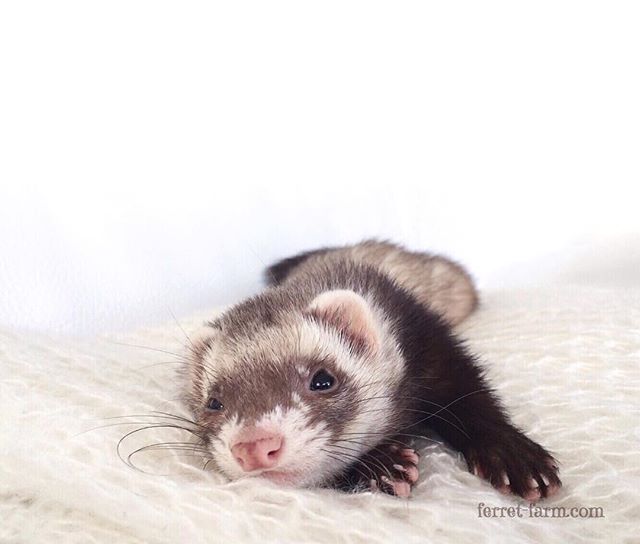 Don’t be afraid to hide the food or make it a little difficult to get to – mental stimulation is great for ferrets and there is nothing wrong with making them think!
Don’t be afraid to hide the food or make it a little difficult to get to – mental stimulation is great for ferrets and there is nothing wrong with making them think!
There is no reason you cannot cook your ferret fresh meat meals at home, rather than purchase commercial ferret pellets, so long as they are getting enough protein and fats. To avoid the risk of disease, cooking meat thoroughly before offering it to your ferret is recommended. There are disadvantages however. Ferrets need to eat 6-8 times per day due to their high metabolic rate, and leaving meat in their cage might be messy. Pellets also help keep your ferret’s teeth clean, an advantage not seen with home-made diets.
How much a ferret needs to eat depends on:
- Age
- Weight
- Activity level
- Reproductive status
- Health status
- Base diet
Usually free-feeding is best for ferrets, but you may find you need to restrict their daily intake if they are becoming overweight.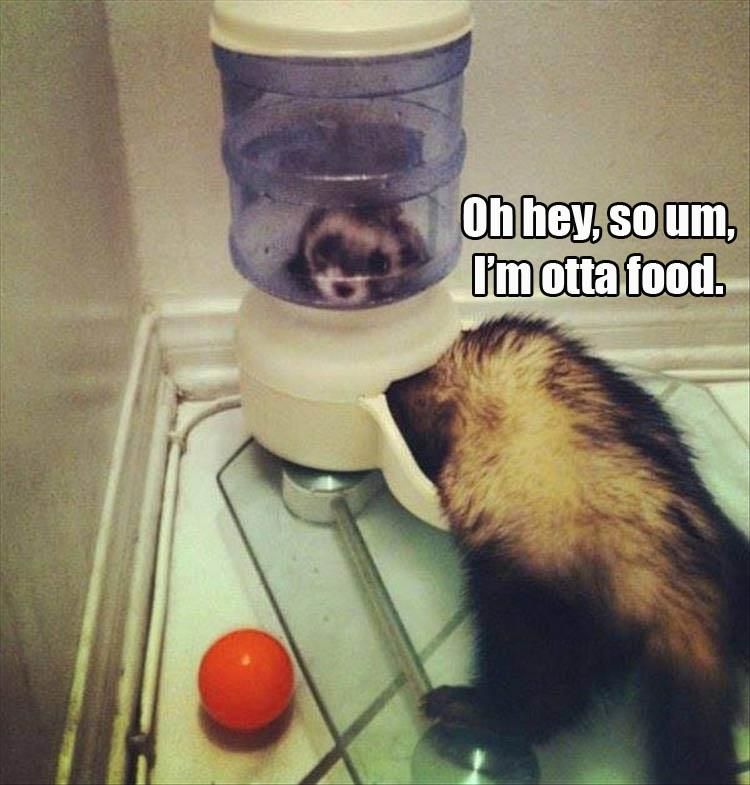
Baby ferrets, or kits, will nurse from their mother for approximately six weeks, but they can be offered small amounts of food soaked until soft with warm water or broth from three weeks old. Over a week, gradually decrease the amount of added liquid, until you are offering the kits only solid pellets alongside their mother’s milk. During this time, replace any uneaten damp food with fresh after a few hours – young kits may start to toilet in the damp food otherwise, which can harm toilet training and will also affect your gill’s food consumption as she won’t eat soiled food unless forced. As your gill’s milk dries up, your young kits should be ready to move onto a dry diet. As well as the base pellet diet, offer a variety of safe foods to kits to try, as ferrets who are not exposed to a range of food types when young are much more likely to outright reject those food items when older.
Ferrets are well designed to digest fats and protein, but struggle with carbohydrates. A lot of sugar has also been potentially implicated in the development of insulinomas in ferrets.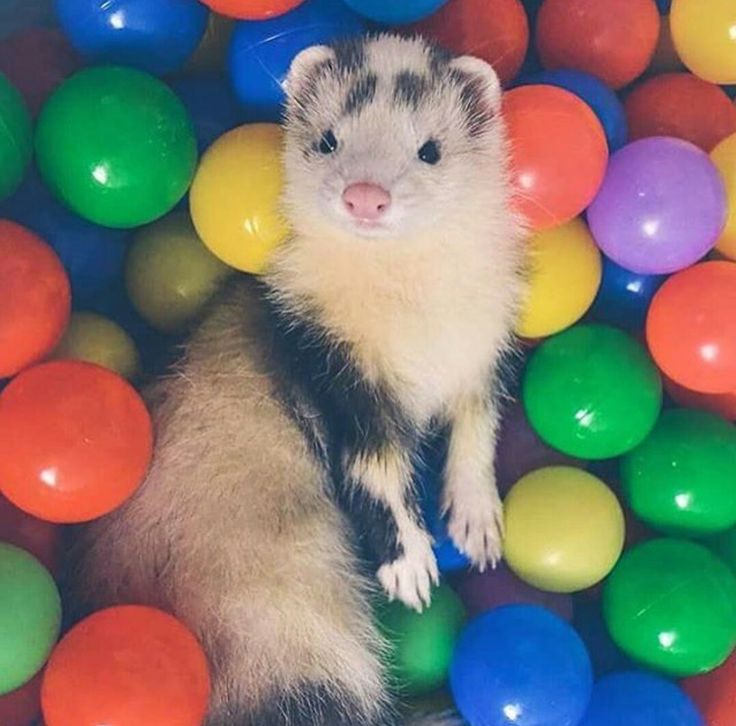 This means sugar is off the menu.
This means sugar is off the menu.
This includes:
- Vegetables - especially hard vegetables such as carrot, which can also block their digestive tract, and avocado. which is poisonous to ferrets.
- Fruit - These are very high in sugar. Grapes/raisins are also toxic to ferrets.
- Dairy - As well as being high in sugar, ferrets lack the enzyme required to digest dairy products.
- Sugary treats - If you want to give treats use ferret or cat treats, or use fresh meat or cooked egg. Some meat-based dog treats may be suitable, but many are carbohydrate heavy and can upset ferret digestion.
- Chocolate - As well as being high sugar, chocolate is toxic to ferrets.
Other items that should also be avoided in ferrets are:
- Cooked bones - These can splinter and seriously damage your ferret's digestive tract.
- Dog and adult cat food - These do not contain enough protein for ferrets.

- Xylitol - This sugar-substitute is also toxic for ferrets, so don't assume something low-sugar is safe for ferrets.
Ferrets can be very fussy where food is concerned, and if they don’t identify a food type as edible early on, it can be difficult to get them to take to it. Changing a ferret’s diet should always be done slowly and carefully – add a little more of the new food item, and take away a little more of anything you want to replace, every day. This slow transition can take several weeks, but patience will be worth it. Ferrets can be very stubborn and cannot be starved into eating something they don’t want.
feeding of young and weaning puppies
Ferrets are cute and funny animals. Raising these animals requires not only patience and desire, but also a certain knowledge of their physiology and the rules for caring for newborn ferrets. If all the nuances are studied in advance, then you can grow strong and healthy offspring.
Why take puppies from their mother?
Weaning of puppies from the mother is done in order to stop the production of lactation in the female. In order to get the next brood soon and allow the female to recover after giving birth, at the age of 5-6 weeks, breeders are already planting puppies. nine0003
In this case, it is necessary to know that the next "hunt" of the female begins already a week after the young stock has been placed. Therefore, it is necessary to introduce a diet for pregnant women again, the female is again prepared for the rut and bearing new offspring.
When is the time for weaning puppies?
The most optimal age, when the foals are already strong enough and can be completely kept without a mother, is 40-45 weeks. Just at this time, young ferrets have teeth and they feed on their own. nine0003
It must be remembered that the longer the ferrets feed on their mother's milk, the stronger and healthier they will be. If the cubs are provided with sufficient feeding, then they can be kept together for a long time. These are quite friendly animals and fights between them are extremely rare.
How to properly separate ferrets?
In order for the foals to be weaned from their mother as comfortably and painlessly as possible, it is necessary to follow the sequence in this process. The depositing process can be divided into several stages:
- Complementary foods start. At the age of two weeks, the female begins to feed the puppies with "adult food". The breeder also begins to take part in this and helps the female with complementary foods. And already from a month and a half, you can completely transfer them to adult food.
- Keeping active. At the age of 1-1.5 months, the auditory canals are already beginning to open in the horyaks, vision is erupting, and they begin to gradually leave their house. It is recommended during this period to take the cubs in your arms as often as possible and play with them. This will help to socialize ferrets faster. nine0024
- Potty training.
The female is also engaged in this, but she can get tired of the offspring and then it is necessary to accustom the cubs to the tray on their own. In the future, this will help maintain hygiene in the animal's home.
- After the cubs have been separated from the mother, a mandatory vaccination should be carried out. This is done in order to prevent frequent diseases in ferrets.
If these simple conditions are met, then there will be no difficulties with the separation of the offspring from the mother. These stages will help kids get comfortable, acquire skills and grow and develop independently. nine0003
Should the litter be separated too early/late?
Because pole puppies differ from other animals in their low ability to maintain a constant body temperature, their body temperature almost equals the temperature of the surrounding air. The female, which is nearby, maintains the temperature of the nest where her cubs live.
For this very reason, early weaning of puppies from their mother is not recommended.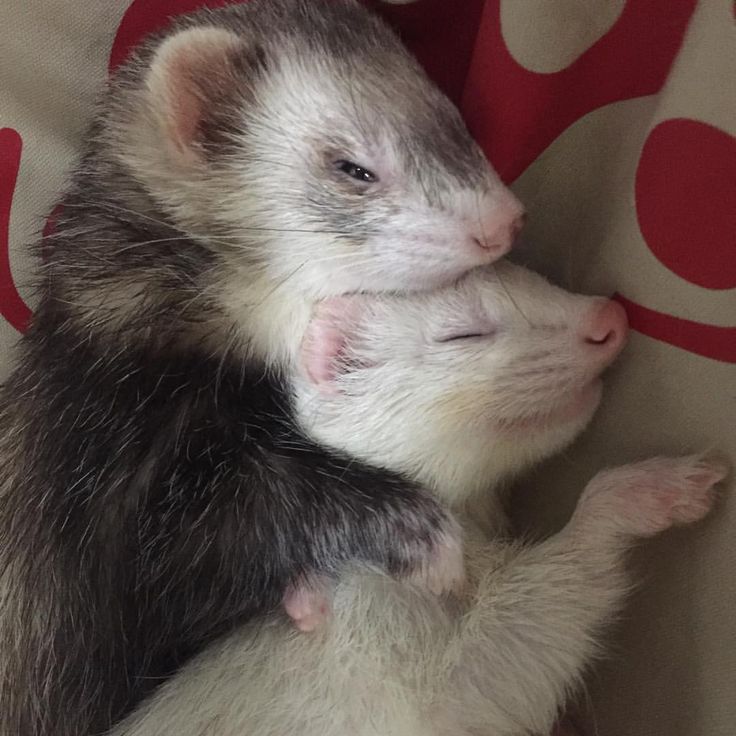 The cub can quickly “freeze”, its fur coat is still unable to warm the baby enough. nine0003
The cub can quickly “freeze”, its fur coat is still unable to warm the baby enough. nine0003
The biggest problem is the early weaning of ferrets from their mothers. Nothing much will happen if the ferret is weaned later, it may even play into the hands of the new owner, since the animal will most likely already be accustomed to the tray and will be treated for parasites.
But there is one caveat. If a person was not present in the upbringing of a ferret cub, then late weaning can lead to stress, the baby will not be socially adapted and its domestication may take several months. nine0003
Conditions for keeping ferrets without a mother
Before weaning offspring from their mother, it is necessary to carefully consider the habitat of grown ferrets. For a comfortable weaning and further life without a mother, the owner should decide how and where the ferret will live.
It will be mandatory to adhere to the following conditions of detention:
- keep the apartment clean, make constant cleaning of the cage and the premises;
- supervise the animal during litter box training; nine0024
- check for cracks and holes in the room and eliminate them;
- keep all dangerous objects out of reach, be careful about open windows, try to keep the kitchen closed.
Landscaping
A ferret is primarily a forest animal, and at first glance it seems that keeping this mobile and nimble animal in an apartment is not a very good idea. In fact, ferrets take root perfectly in an apartment, they are unpretentious and it will not be difficult to create housing for your pet. nine0003
You can consider some options for keeping a ferret in an apartment:
- Cage. Although the ferret seems like a small animal, the cage for it should be quite spacious. This is necessary so that the ferret can safely move around it and play. It is recommended to use not rods as a material, but a metal mesh. This will protect the animal's teeth, because it will probably try to gnaw through the cage.
- Bed. We all love to feel comfortable while sleeping. Animals are no exception. The place to sleep should be soft and comfortable. You can lay out rags and build something in the form of a mink. In pet stores, you can now buy special hammocks for rodents.
If your animal is already moving freely around the apartment, then do not be surprised that he will choose your bed or chair as a place to sleep. The ferret will rest with pleasure after its active games. nine0024
- Play area. Ferrets are very fond of tunnels and labyrinths. You can build such fun yourself, or you can buy it at a pet store. In the play area, you can place different toys, ferrets love to play with them and gnaw on them.
But it must be remembered that even the most comfortable and well-equipped cage cannot replace freedom for an animal. Let your pet out of the cage for at least a couple of hours, but keep it safe.
Containment conditions
Proper care is very important when keeping ferrets. There are many factors to consider in order for the animal to feel comfortable in your home. Let's consider the most important ones:
- Temperature regime. It needs to be monitored. Since the domestic ferret is a subspecies of the forest ferret, it reacts poorly to heat.
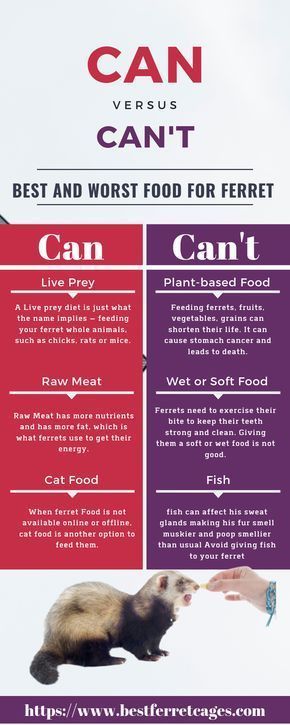 The most comfortable temperature for keeping is 10 to 25 ° С. If the temperature is higher, then the animal can get heat stroke.
The most comfortable temperature for keeping is 10 to 25 ° С. If the temperature is higher, then the animal can get heat stroke.
If your room is sunny, consider getting an air conditioner or put your pet in a small pool so that he can cool off a little at any time; nine0003
- Air humidity. The room must be well ventilated. High humidity causes profuse sweating in ferrets and difficulty breathing. Dry air is also harmful. The drier, the more dust accumulates, the membrane of the mucous membranes and respiratory tract dries up. The skin can peel off, the claws become brittle. Optimum humidity - 60-70%;
- Lighting. If you keep a ferret at home, you must remember that daylight hours should be similar to natural daylight hours. The correct mode of daylight hours will allow you to produce enough melatonin, a key coordinator of biological rhythms. nine0024
If there is not enough melatonin in the body, the adrenal glands begin to malfunction and this can become a prerequisite for such a disease as hyperadrenocorticism.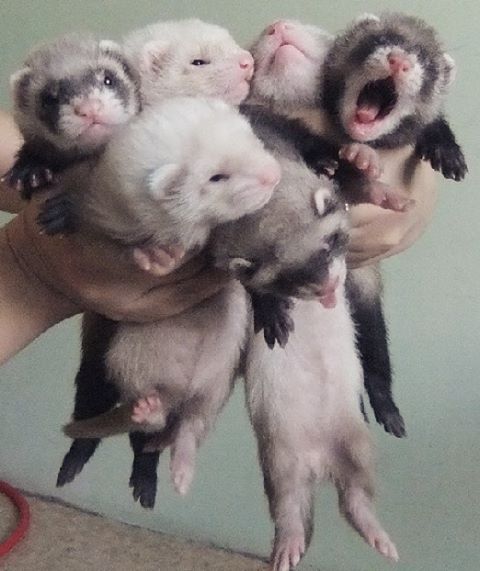
Equipment
In order to provide the necessary care for puppies, and subsequently for adults, the breeder will need auxiliary materials. They will help create not only comfortable conditions for the pet, but also ensure a comfortable and safe life for the pet in captivity.
Here is a list of the most needed supplies:
- Cage. Earlier we considered the most convenient housing option for a ferret. Before buying a cage, be sure to study the requirements of the home, select the most optimal option.
- Tray. This accessory serves as a "toilet" for the ferret, where he celebrates his natural needs.
- Hammock. An accessory that brings special joy to the ferret. Ordinary litter is not so attractive to animals. Ferrets prefer hammocks, thanks to which they are in limbo and enjoy dreams. nine0024
- Drinker and bowl. The main requirement is the reliability of fastening on the cage bars.
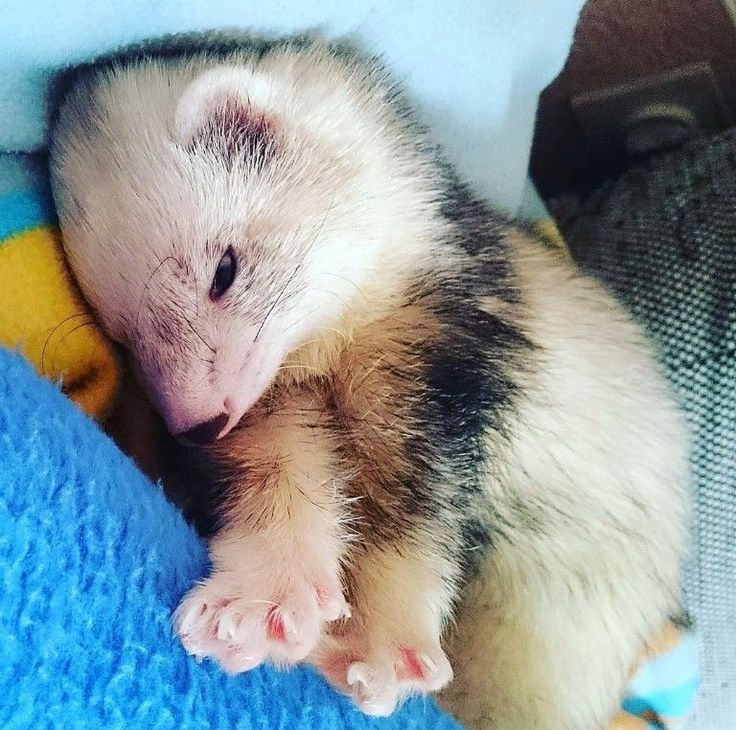 A ferret can turn over an ordinary outdoor bowl and a drinking bowl and all the contents will be on the floor in a cage. Pet stores have a good selection of bowls that will securely attach to the cage bars.
A ferret can turn over an ordinary outdoor bowl and a drinking bowl and all the contents will be on the floor in a cage. Pet stores have a good selection of bowls that will securely attach to the cage bars. - Carry. You will need this accessory for a long time. Walking and going to the vet with a carrier will keep your ferret calm during transport.
- Harness. Ferrets love being outdoors. The harness will help control the movement of the animal and help prevent the "escape" of the pet. nine0024
- Toys. In order for the ferret not to choose your thing for his entertainment, prepare entertaining toys for him. They must be hard enough so that the animal cannot swallow small particles.
All equipment for keeping a ferret can be made from scrap materials. Show your imagination and ingenuity and you will be able to attract the attention of your pet without making any special efforts.
Young stock feeding
Baby ferrets grow quickly and gain weight. At 4 months old, a cub can be compared to
already with a one-year-old animal. For full development, ferret food should be as balanced as possible, fresh and high-calorie.
Some owners give cat food to ferrets. Better to avoid it. Ferrets and cats have different needs. It is advisable to purchase food that is designed specifically for ferrets. It can be easily purchased at any pet store, but be prepared for the fact that ferret food is not cheap. nine0003
When can ferrets be fed?
Ferrets are mammals. The female feeds her cubs up to 1.5 months. Until this age, puppies are on a "milk diet". Then they can be gradually transferred to adult food.
Another thing is if a horiha refuses to feed her offspring. Little ferrets are very difficult to feed, since many foods are contraindicated for them, including cow's milk. Goat's milk is recommended, but should be diluted with water. You can also add buckwheat or oats there. nine0003
What can and cannot be given?
Feeding your pet should take into account the nutritional needs of ferrets and control the balance in the diet.
The main diet is meat, because by nature ferrets are predators. But sometimes the owner really wants to pamper his pet. It is worth observing the norm in delicacies and not replacing them with the main diet.
Below are the foods you can give your ferret:
- Cucumber. This vegetable is good for the kidneys but should be peeled before serving. nine0024
- Chicken eggs. It is not recommended to give them raw to a ferret. After boiling, you can give a small piece of yolk.
- Quail eggs. Preferably chicken, but should not be given more than once a week.
- Fruit. Berries of strawberries, currants, wild strawberries in small quantities. Apple, pear, banana are given without seeds and peel. Watermelon and melon are useful for removing toxins.
- Curd. Also given in small quantities and with a fat content of no more than 2%. nine0024
- Chicken gizzards.
 Can be given dry. Chicken fillet is allowed a small piece, previously scalded in boiling water.
Can be given dry. Chicken fillet is allowed a small piece, previously scalded in boiling water.
Improper diet can lead to disturbances in the animal's body. Therefore, it is necessary to know the list of products that are contraindicated for ferrets:
- Sugar-containing products. These include sweets, chocolates and others. Flour products are also not recommended: cookies, gingerbread, etc.
- Dairy products. Of these, only cottage cheese can be given in small quantities.
- Food from the table. Fried, salty, spicy. Sausage, smoked meats, pickles are contraindicated for ferrets;
- Nuts, mushrooms. They must not be given under any circumstances.
- Food for cats and dogs. Especially if it is economy class. Before you give your ferret food from a pet store, you need to carefully study the composition.
What to drink?
Ferrets need constant access to fresh water, especially if the animal consumes dry food.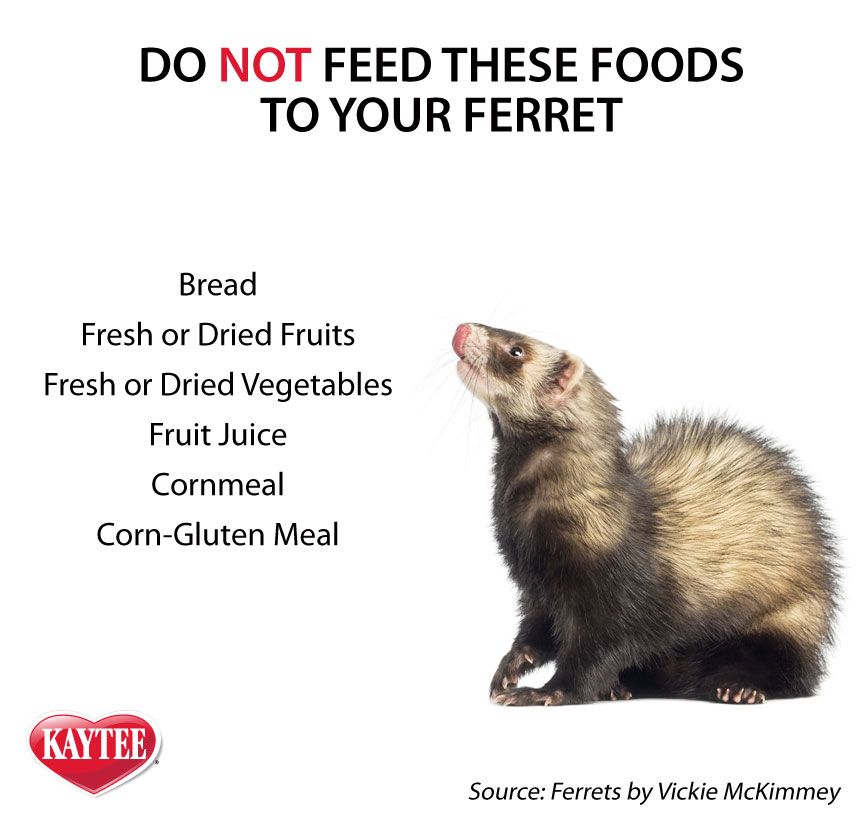 The volume of water is equal to the volume of dry food multiplied by three. And in warm weather, a ferret needs especially a lot of water.
The volume of water is equal to the volume of dry food multiplied by three. And in warm weather, a ferret needs especially a lot of water.
Ferrets that are deprived of water begin to refuse food. Make sure the water is constant. And since little ferrets like to play in the water and they gradually pollute it with leftover food, pay attention to the freshness of the water. Convenient to serve bottled water. nine0003
Milk is not recommended to drink, lactose is poorly digested and the ferret may have an upset stomach. Drinks, tea, compote should not be given in any case.
Approximate diet of puppies
Raising a baby ferret is a rather laborious process. Usually, the first weeks of life pass quietly and the puppies do not require special attention, the female takes care of her ferrets herself.
You can see the approximate diet of puppies in the table:
| Puppy age | Complementary foods | Feeding frequency |
| 20-25 days | Complementary foods begin with liquid mince. Fresh minced meat can be mixed with low-fat cream or kefir to a semi-liquid state. Vitamins: phosphorus, calcium, vitamins A and B, proteins are necessary for the growth of puppies. Fresh minced meat can be mixed with low-fat cream or kefir to a semi-liquid state. Vitamins: phosphorus, calcium, vitamins A and B, proteins are necessary for the growth of puppies. | 1-2 times a day |
| 1.5-2 months | Stuffing may not be diluted. Gradually it is recommended to introduce all kinds of food. | 4-5 times a day |
| 3-4 months | Minced meat and fish, broth, chopped vegetables. Be sure to give phosphorus and calcium for the formation of the skeleton. Freshly frozen fish contains these vitamins. | 3-4 times |
| 5-6 months | It is already possible to fully switch the ferret to an "adult diet". During this period, growth slows down and the ferret begins to eat less. | 2 times |
Ferrets reach sexual maturity by 10 months. Estimated life expectancy is 8-10 years. As you get used to, accustom the puppy to one feeding place. nine0003
What vitamins do young animals need?
In order for a ferret to develop normally, it needs to be given vitamins. Due to their lack, the animal may lose its mood, and the coat may fade. It is very important for small predators to give vitamins and minerals during estrus, pregnancy and lactation.
Due to their lack, the animal may lose its mood, and the coat may fade. It is very important for small predators to give vitamins and minerals during estrus, pregnancy and lactation.
In addition to complex supplements, which are now on the shelves of almost all pet stores, vitamins can also be obtained from natural sources:
- vitamin A is found in milk, liver, fish oil; nine0024
- vitamin B can be obtained from liver, meat, yeast;
- vitamin D is found in fat;
- Vitamin E is found in sufficient quantities in green peas;
- Vitamin K is derived from seafood and broccoli;
- Ferrets don't need much vitamin C. But if there is not enough vitamin A, then the synthesis of vitamin C will deteriorate. Ferrets are very active and inquisitive. But in order to maintain a playful mood in them, special attention should be paid to nutrition and conditions of detention, especially if you decide to take a very small ferret. nine0003
Author of the publication
What to feed a ferret - how a ferret eats at home, what they can eat and how to make a diet
What do ferrets eat is the first question that future owners ask veterinarians and pet store employees.
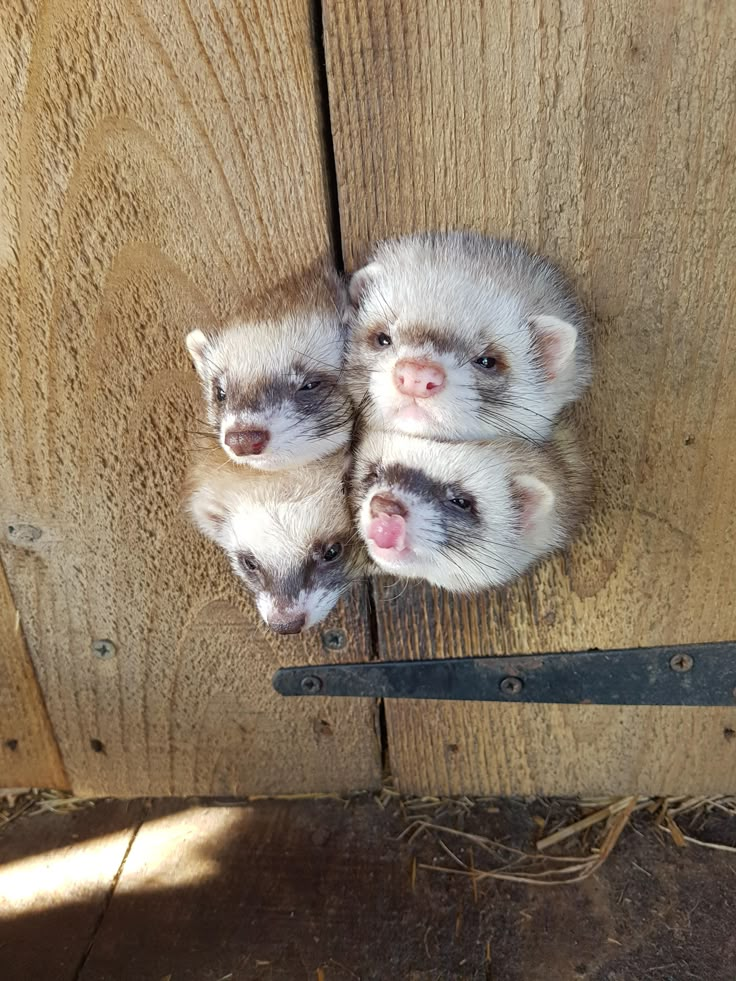 Today we will tell you what the nutrition of a ferret should be, we will offer the optimal feeding scheme at home.
Today we will tell you what the nutrition of a ferret should be, we will offer the optimal feeding scheme at home. What do ferrets eat?
Ferrets are predators by nature. In their natural environment, they independently obtain food: they hunt rodents, small birds, frogs, lizards, and insects. Animals love to eat fish, but this product is not the main one. nine0003
The animal receives the microelements and substances necessary for life from animal food. There are practically no plants in his usual menu. This fact must be taken into account when planning a diet.
How to feed a ferret at home?
You can use natural food or buy ready-made foods that are sold in pet stores and veterinary clinics. The latter option is preferable, since ready-made mixtures contain the necessary set of minerals and trace elements. nine0003
Regardless of which food option you choose, the animal should receive per day:
- protein of animal origin - at least 30% of the total portion;
- fats - about 20%;
- complex carbohydrates - 10-15%;
- fiber - up to 3-5%.
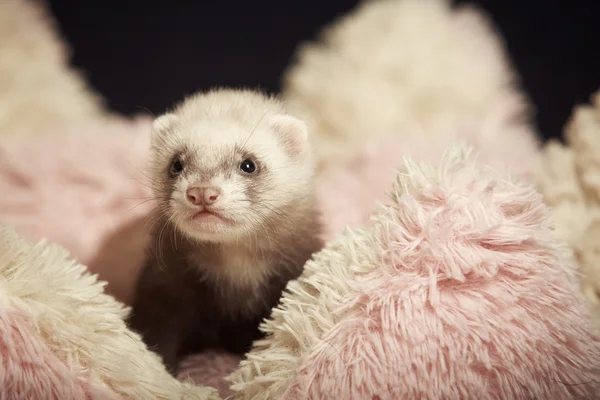
Cute predators independently obtain food only in the wild. This is not possible in an apartment setting. Therefore, the main task of the owner is to provide his pet with all the conditions for a comfortable and healthy life. nine0003
What can be given to ferrets?
There is a list of allowed and prohibited products.
Let's start with those that can be given to small predators:
- meat - chicken, turkey, beef (lean), pork, rabbit meat, boiled lamb;
- seafood - sea fish, squid, peeled shrimp;
- cereals from several cereals;
- boiled eggs.
What should not be fed to a ferret? nine0005
In order not to harm your pet, protect it from vegetables and fruits. The digestive system of ferrets is not designed to digest large amounts of plant foods.
What else you need to give up:
- baked goods;
- any nuts;
- desserts containing sugar;
- products containing salt, spicy spices;
- roasted, smoked meat;
- onion, garlic.
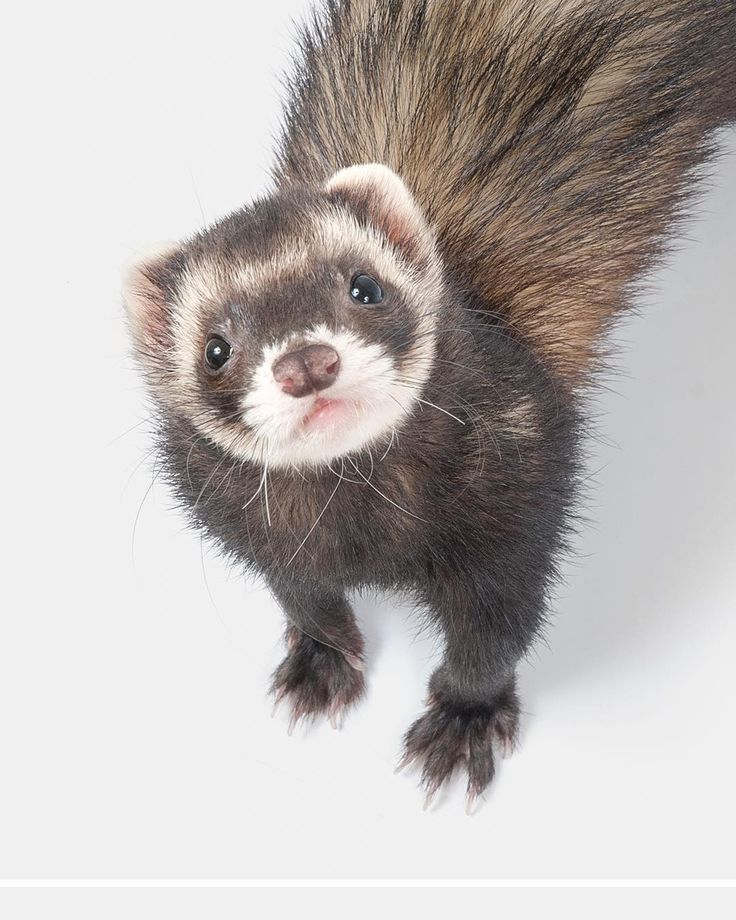 nine0024
nine0024
Do not feed your pet from the table and do not try to give your ferret dry or canned dog or cat food.
What do ferrets eat: treats
If you want to pamper the animal, remember that the treat should be not only tasty, but also healthy. You can give cottage cheese with a minimum fat content, dates, bananas, pieces of hard cheese.
The listed products cannot be used as the main diet. Veterinarians recommend giving them no more than 2 times a week. nine0003
Natural food based ferret diet
If you decide to cook for your pet yourself, do not add salt and spices to his food.
The daily diet should consist of the following parts:
- two-thirds meat and offal;
- one third - cereals: buckwheat, oatmeal, millet.
Males should eat at least 300 grams per day, females - about 150-200 grams, cubs - 100 grams. nine0003
Live food for ferrets
Not every owner will go to ensure that the diet of the animal is fully consistent with its nutrition in the natural environment.
